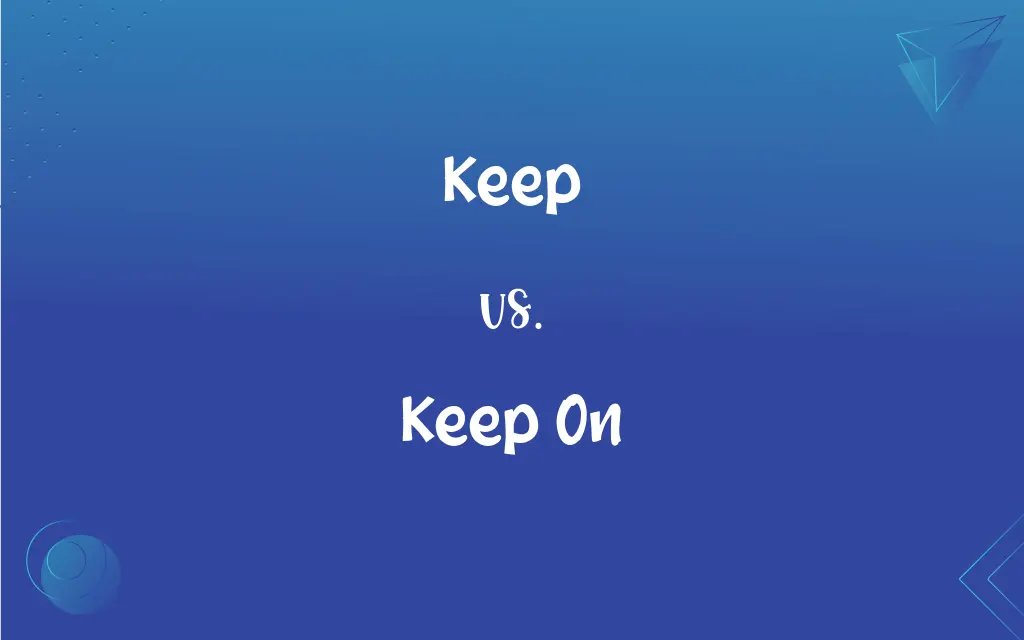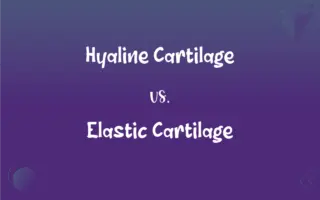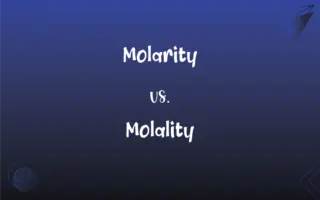Keep vs. Keep On: What's the Difference?
Edited by Harlon Moss || By Janet White || Published on December 31, 2023
"Keep" means to maintain or hold, while "keep on" implies continuing an action without stopping.

Key Differences
"Keep" generally refers to holding onto or maintaining something, like keeping a promise. In contrast, "keep on" suggests a continuous action, such as keep on walking, implying ongoing movement or activity.
In usage, "keep" can denote possession or maintenance of a state, like keeping something safe. "Keep on," however, often appears in more dynamic contexts, signifying the persistence of an action, like keep on trying.
The word "keep" can be versatile, used in various contexts from physical holding to emotional states. "Keep on," on the other hand, is more specific to actions and often used in motivational or persistent scenarios.
"Keep" can function independently as a verb, but "keep on" typically requires an object or action to follow, emphasizing the action's continuation.
In a grammatical sense, "keep" is a standalone verb, whereas "keep on" is a phrasal verb, adding the preposition "on" to denote ongoing action.
ADVERTISEMENT
Comparison Chart
Verb Type
Standalone Verb
Phrasal Verb
Usage
Maintenance, Holding
Continuing Action
Context
General, Diverse
Dynamic, Action-Oriented
Dependency on Objects
Can be independent
Often needs an object/action
Connotation
Static, Possessive
Dynamic, Persistent
ADVERTISEMENT
Keep and Keep On Definitions
Keep
To maintain possession.
Keep the book safe.
Keep On
To proceed without interruption.
Keep on working.
Keep
To continue to have something.
Keep your focus.
Keep On
To continue an action.
Keep on running.
Keep
To hold or detain.
Keep the door closed.
Keep On
To persist in an activity.
Keep on studying.
Keep
To preserve or maintain.
Keep the peace.
Keep On
To not stop doing something.
Keep on singing.
Keep
To adhere to.
Keep your word.
Keep On
To maintain a course.
Keep on the path.
Keep
To retain possession of
Kept the change.
Must keep your composure.
Keep
To have as a supply
Keep spare parts in case of emergency.
FAQs
What does "keep" mean?
"Keep" means to maintain or hold something.
Can "keep" be used without an object?
Yes, "keep" can be used independently, like in "keep safe."
Can "keep" denote emotional states?
Yes, "keep" can refer to emotional states, like "keep calm."
Can "keep" be used in legal contexts?
Yes, "keep" can be used in legal contexts, like "keep custody."
Is "keep on" a phrasal verb?
Yes, "keep on" is a phrasal verb indicating ongoing action.
How is "keep on" different from "keep"?
"Keep on" implies continuing an action, while "keep" is about maintaining or holding.
Does "keep" have a static connotation?
"Keep" often has a static or possessive connotation, like "keep a secret."
Is "keep on" more dynamic than "keep"?
Yes, "keep on" is generally more dynamic, indicating continued action.
Can "keep" be used in commands?
Yes, "keep" is often used in commands, like "keep quiet."
Is "keep" commonly used in everyday language?
Yes, "keep" is a common verb in everyday usage.
Is "keep on" used for persistent actions?
Yes, "keep on" is often used to suggest persistence, like "keep on trying."
Are there idiomatic uses of "keep"?
Yes, "keep" has idiomatic uses, like "keep up with."
Can "keep" indicate preservation?
Yes, "keep" can suggest preservation, like "keep traditions alive."
Does "keep on" require an additional verb?
Yes, "keep on" typically requires a following action, like "keep on walking."
Is "keep on" used in specific scenarios?
"Keep on" is often used in scenarios requiring ongoing effort or action.
Can "keep" be used in formal writing?
Yes, "keep" is suitable for both formal and informal contexts.
Can "keep on" be motivational?
Yes, "keep on" can be used motivationally, like in "keep on going."
Is "keep on" versatile in usage?
"Keep on" is less versatile than "keep," often related to actions.
Does "keep on" imply a long-term action?
Often, "keep on" implies a longer duration or ongoing process.
Does "keep on" always need an object?
"Keep on" usually requires an object or action to follow.
About Author
Written by
Janet WhiteJanet White has been an esteemed writer and blogger for Difference Wiki. Holding a Master's degree in Science and Medical Journalism from the prestigious Boston University, she has consistently demonstrated her expertise and passion for her field. When she's not immersed in her work, Janet relishes her time exercising, delving into a good book, and cherishing moments with friends and family.
Edited by
Harlon MossHarlon is a seasoned quality moderator and accomplished content writer for Difference Wiki. An alumnus of the prestigious University of California, he earned his degree in Computer Science. Leveraging his academic background, Harlon brings a meticulous and informed perspective to his work, ensuring content accuracy and excellence.






































































